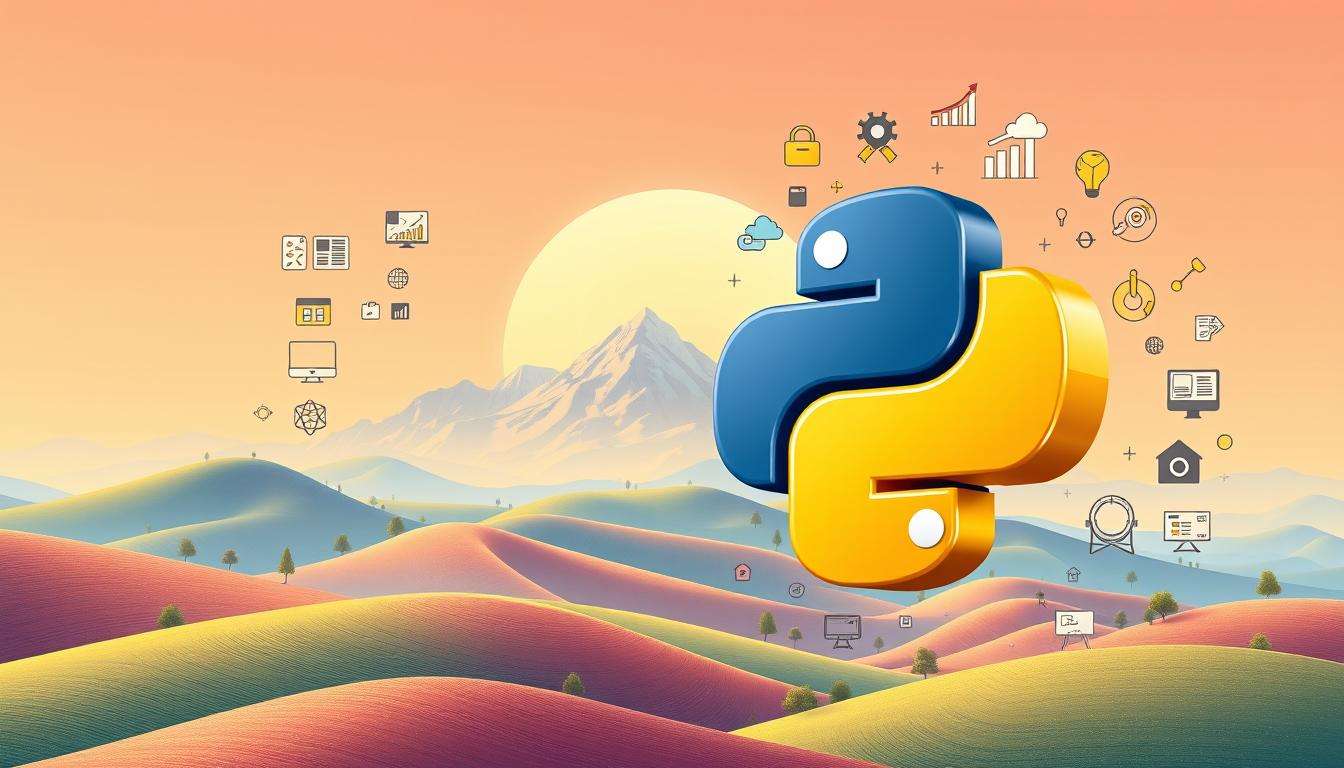Benefits of Learning Python
Are you thinking about how to improve your coding skills and advance your career? In today’s tech world, knowing the benefits of learning Python can be a big step forward.
Python is easy to learn, versatile, and used in many areas, making it a valuable skill.
When you learn Python, you unlock many opportunities. You can work in data science, machine learning, web development, and automation. Python’s large libraries and strong community support help you start and grow as a developer.
Key Takeaways
- Mastering Python can significantly boost your career prospects.
- Python is versatile and can be applied in various domains.
- It’s an ideal language for beginners and experienced developers alike.
- Python’s extensive libraries simplify complex tasks.
- Learning Python opens up opportunities in data science, machine learning, and more.
Why Python Has Become a Programming Powerhouse
Python’s rise in the tech world is a tale of versatility and adaptability. It has grown by evolving and meeting the needs of developers and industries.
Python’s Rise to Prominence in the Tech World
Python’s growth has been remarkable. It’s known for its simplicity and wide range of applications.
Historical Growth and Adoption Rates
Python’s adoption rates have been impressive. It’s become popular in many sectors. Major tech companies use it for various tasks, boosting its use.
Major Companies Using Python
Google, Instagram, and Netflix use Python for web development and data analysis. This has made Python even more popular.
Key Characteristics That Make Python Stand Out
Python’s readability and clean syntax attract developers. It’s an interpreted language, offering speed and ease in development and debugging.
Readability and Clean Syntax
Python’s syntax is easy to read and understand. This makes it great for new developers and boosts productivity.
Interpreted Language Advantages
As an interpreted language, Python supports rapid development and testing. It’s perfect for projects needing quick changes and flexibility.
Python’s simplicity, versatility, and community support have made it a top choice in programming.
The Benefits of Learning Python for Career Advancement
Python is key for career growth in today’s tech world. It’s easy to use and in demand across many fields.
High Demand for Python Developers in the Job Market
The job market wants more Python developers. This is because Python is easy to learn and used in new tech.
Current Job Statistics and Trends
Python is a top choice for employers. Job boards and reports show Python developer jobs are highly sought after.
Remote Work Opportunities
Python work is great for remote teams. This means Python pros can work from anywhere, enjoying flexible hours.
Salary Advantages for Python Professionals
Python experts get good pay because they’re in demand. Salaries vary by experience, location, and field.
Entry-Level to Senior Position Compensation
Here’s a salary guide for Python pros at different levels:
| Position | Average Salary Range (USD) |
|---|---|
| Entry-Level Python Developer | $60,000 – $80,000 |
| Mid-Level Python Developer | $80,000 – $110,000 |
| Senior Python Developer | $110,000 – $140,000 |
Industries Actively Seeking Python Expertise
Python is valuable in many fields, from tech to finance.
Tech Sector Opportunities
The tech world needs Python experts for software, data analysis, and more.
Non-Tech Industries Embracing Python
Finance, healthcare, and science are using Python for data and machine learning.
Learning Python boosts your career. It opens doors in tech and non-tech fields.
Python’s Gentle Learning Curve for Beginners
Python is perfect for new programmers because of its simple syntax and lots of resources. It’s easy to learn, so beginners can focus on programming ideas without getting lost in complicated rules.
Readable Syntax and Straightforward Structure
Python’s big plus is its readable syntax. Its code is clear and simple, like plain English. This makes it easier for newbies to write and understand their code.
Comparison with Other Programming Languages
Python is more straightforward than languages like Java or C++. For instance, Python uses spaces to show where code blocks start and end. This makes the code neat and simple to follow.
| Language | Syntax Complexity | Readability |
|---|---|---|
| Python | Low | High |
| Java | Medium | Medium |
| C++ | High | Low |
Abundant Learning Resources for New Programmers
Python’s fame means there’s a lot of help for beginners. They can find many online courses, tutorials, and interactive learning platforms to start with.
Online Courses and Tutorials
Coursera, Udemy, and edX have lots of Python courses. These sites offer step-by-step learning, with videos, quizzes, and projects.
Interactive Learning Platforms
Codecademy and Repl.it let beginners practice Python in their browsers. They have interactive coding spaces.
Quick Progress from Basics to Practical Applications
Python’s ease and many libraries help beginners move fast from basics to real-world uses. This quick progress boosts motivation and confidence.
First Projects for Beginners
Start with simple projects like calculators or games. As skills grow, move to more challenging tasks, like data analysis or web scraping.
Advantages of Learning Python for Beginners
Python is a great choice for new programmers. It’s easy to learn and understand. This makes it perfect for those just starting out.
Building Confidence in Programming Skills
Python is easy to get started with. Beginners can learn the basics quickly. This helps them feel more confident in their coding skills.
Early success stories also encourage learners to keep going. They see how far they can go.
Early Success Stories
Many beginners feel a big sense of achievement when they start with Python. They build simple projects and see their progress. This boost in confidence is key to keep learning.
Creating a Foundation for Other Languages
Learning Python helps you understand other programming languages better. The concepts you learn in Python are transferable. This makes it easier to learn more languages.
Transferable Concepts and Principles
Python teaches you about variables, data types, and control structures. These are the basics of programming. Knowing these helps you learn other languages faster.
Developing Problem-Solving Abilities
Python helps beginners improve their problem-solving skills. It teaches them to break down problems into smaller parts. This improves their logical thinking and analytical skills.
Logical Thinking Enhancement
Python teaches beginners to solve problems in a systematic way. This develops their logical thinking. This skill is useful in programming and other areas of life.
Versatility Across Multiple Programming Domains
Python stands out because it can be used in many areas of programming. This makes it very popular among developers. It’s also key in the tech world.
Web Development with Python
Python is great for web development because it’s easy to use. It has strong frameworks like Django and Flask. These help developers make big, fast web apps.
Backend Development Frameworks
Django gives developers a solid base for building web apps. It has templates and APIs that make development quick and easy.
Full-Stack Capabilities
Python can handle both front-end and back-end tasks. This makes it perfect for full-stack development. It’s very useful in web projects.
Software Development Capabilities
Python isn’t just for web apps. It’s also used for desktop and mobile apps. Its libraries and tools make development easier.
Desktop Applications
For desktop apps, Python uses Tkinter and PyQt. These libraries have everything needed for GUI development.
Mobile App Development
Kivy lets developers make mobile apps for different platforms. This expands Python’s use in the mobile world.
Game Development Possibilities
Python is also good for making games. Engines like Pygame and Panda3D provide tools for game creation.
Popular Python Game Engines
- Pygame
- Panda3D
Scientific Computing Applications
Python is also key in scientific computing. It’s used in research and academics. Libraries like NumPy and Pandas are crucial for data work.
Research and Academic Uses
Python is simple and has many scientific libraries. This makes it a top choice for data analysis and visualization in schools and research.
Learning Python opens many doors in programming. It shows why learning Python is so important today.
Python’s Robust Community and Support System
Python has a vibrant and supportive community. This community is key for both new and seasoned developers.
Active Online Communities and Forums
Python’s online world is huge. It has many forums and communities for developers. Stack Overflow and Reddit are top spots.
Stack Overflow and Reddit Resources
Stack Overflow and Reddit’s r/learnpython and r/Python are perfect for asking questions. You can also share projects and get feedback from pros.
Regular Meetups and Conferences
Python developers enjoy regular meetups and conferences. These events are great for networking and learning.
Networking Opportunities
These gatherings are ideal for meeting new people. You can learn about Python’s latest and share your own stories.
Collaborative Problem-Solving Networks
The Python community is all about teamwork. Many developers work on open-source projects and help each other out.
Open Source Contribution Pathways
Working on open-source projects is a great way to learn. It helps you build your portfolio and meet other developers.

| Community Resource | Description | Benefit |
|---|---|---|
| Stack Overflow | Q&A platform for developers | Quick solutions to coding problems |
| Community forums for discussion | Feedback on projects and ideas | |
| Meetups and Conferences | In-person events for networking | Opportunities to meet other developers |
Benefits of Python Certification for Professional Growth
In today’s job market, a Python certification can really help developers stand out. As tech advances, more companies need skilled Python experts. Getting certified is a smart way to show you’re ready for the challenge.
Types of Python Certifications Available
Many organizations offer Python certifications for all levels and goals. Some top ones are:
- Python Institute’s Python Programming Certification
- Data Science with Python Certification by Data Science Council of America (DASCA)
- Certified Python Programmer by Python Certification Institute
Industry-Recognized Credentials
These certifications prove your skills in Python, data analysis, and more. They make you more appealing to employers.
How Certification Enhances Job Prospects
Getting certified shows you’re serious about your skills. Employers like this because it means you’ve passed tough tests. This can make you a top choice for jobs.
Employer Perspectives on Certified Developers
Employers see certified developers as more skilled and ready for big projects. A survey found that certified pros are 25% more likely to get senior roles.
Return on Investment for Python Training
Investing in Python certification can really pay off. You might see:
- Higher salary packages
- Faster career growth
- More job security
Career Advancement Statistics
Getting certified can really boost your career. You could see an average salary jump of 15% in the first year after getting certified.
Powerful Libraries and Frameworks That Accelerate Development
Python’s world is filled with many libraries and frameworks. They make development faster and easier. You can work on tasks like data analysis, web development, machine learning, and automation with less effort.
Data Analysis with Pandas and NumPy
Data analysis is key in many projects. Pandas and NumPy are essential tools for this. They help manage and process big data sets efficiently.
Real-World Applications
- Data cleaning and preprocessing
- Data visualization
- Statistical analysis
These libraries are used a lot in finance, healthcare, and research. They’re great for tasks that need a lot of data.
Web Frameworks: Django and Flask
For web projects, Python has Django and Flask. Django is powerful and full-featured. Flask is simpler and more flexible.
Comparing Framework Capabilities
| Framework | Complexity | Use Cases |
|---|---|---|
| Django | High | Complex, scalable web applications |
| Flask | Low | Simple web applications, prototyping |
Machine Learning Libraries: TensorFlow and PyTorch
TensorFlow and PyTorch are top machine learning tools in Python. They help build and use complex models and algorithms.
Industry Implementation Examples
These libraries are used in many fields. For example, in image and speech recognition, natural language processing, and predictive analytics.
Automation Libraries and Tools
Python’s automation tools make tasks like scripting and data scraping easier. They also help with DevOps.
DevOps Integration
Automation libraries are key for DevOps. They help make continuous integration and deployment (CI/CD) smoother.
Python’s Dominance in Data Science and AI
Python is a top choice for data science and AI. It’s easy to use and packed with tools for analyzing data and learning from machines. This makes Python a must-have for experts in these areas.
Tools for Data Visualization and Analysis
Python has many libraries for working with data, like Pandas and NumPy. These tools make it easier to handle and understand big data sets.
Creating Impactful Data Stories
Libraries such as Matplotlib and Seaborn help data scientists create engaging visuals. These visuals tell stories, making insights clear to everyone.
Machine Learning Implementation
Python’s scikit-learn library offers many machine learning algorithms. This lets data scientists build models that predict outcomes, guiding business choices.
Predictive Modeling Capabilities
Data scientists use Python’s machine learning to forecast trends. This helps businesses stay competitive by anticipating changes.
Natural Language Processing Capabilities
Python is also great for Natural Language Processing (NLP). Thanks to NLTK and SpaCy, it can analyze and create human language.
Text Analysis and Generation
Python’s NLP tools help build apps that understand and create text. They grasp the subtleties of human language.
Deep Learning Applications
Python is perfect for deep learning with TensorFlow and PyTorch. It’s great for making neural networks.
Neural Networks and Advanced AI
These frameworks help build complex neural networks. They solve tough AI problems, expanding AI’s capabilities.
Python’s wide range of tools for data science and AI keeps professionals empowered. It fuels innovation in these fields.
The Importance of Learning Python in Today’s Digital Economy
As the digital world grows, learning Python is more important than ever. Python is a key player in the tech world, helping with digital changes.
Python’s Role in Digital Transformation
Python is crucial in digital changes across many fields. Its ease and flexibility make it perfect for companies wanting to improve efficiency.
Automation and Efficiency Gains
Python is making a big difference in automation. It helps companies automate tasks, boosting productivity and cutting costs. This move towards automation is key for digital growth, making businesses more flexible and quick to adapt.
Future Technology Trends Powered by Python
Python is leading in many new tech trends. Its wide range of libraries and frameworks make it a top pick for developers.
IoT and Edge Computing
The Internet of Things (IoT) and edge computing are big areas for Python. Its simplicity and support for libraries like PyTorch and TensorFlow make it great for these fields.
Blockchain Applications
Python is also key in blockchain applications. Its ease and the availability of development libraries are making it popular for blockchain projects.
Long-Term Career Sustainability
Learning Python not only creates job chances right away but also secures long-term career stability. As tech evolves, being able to learn and adapt is essential.
Adapting to Industry Changes
Getting Python skills helps professionals adjust to industry shifts. Python’s wide use in fields like web development and data science makes it a valuable skill for career growth.
Conclusion: Embracing the Python Advantage
The digital economy is growing fast, and Python is at the forefront. Its flexibility, ease of use, and vast libraries make it a key player in many fields. This includes web development, data science, and artificial intelligence.
Learning Python can boost your career, thanks to its high demand and good salaries. It’s also great for beginners because it’s easy to learn. You can go from the basics to real-world projects quickly.
Python has a strong community that supports and helps each other grow. This makes it a great place to learn and innovate. As technology gets better, using Python can help you keep up and find new opportunities.
Whether you’re already coding or just starting, Python is a smart choice. It’s crucial for data science, AI, and more. Learning Python can help you stay ahead in the tech world.







